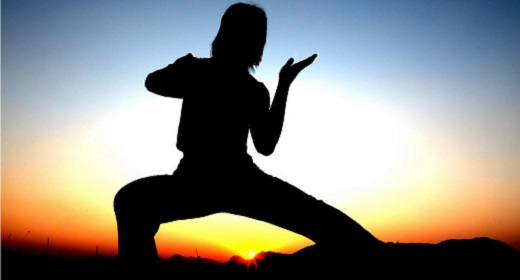Tai chi helps reduce stress and anxiety. And it also helps increase flexibility and balance…

If you’re looking for a way to reduce stress, consider tai chi (TIE-CHEE). Originally developed for self-defense, tai chi has evolved into a graceful form of exercise that’s now used for stress reduction and a variety of other health conditions. Often described as meditation in motion, tai chi promotes serenity through gentle, flowing movements.
What is tai chi?
Tai chi is an ancient Chinese tradition that, today, is practiced as a graceful form of exercise. It involves a series of movements performed in a slow, focused manner and accompanied by deep breathing.
Tai chi, also called tai chi chuan, is a noncompetitive, self-paced system of gentle physical exercise and stretching. Each posture flows into the next without pause, ensuring that your body is in constant motion.
Tai chi has many different styles. Each style may subtly emphasize various tai chi principles and methods. There are variations within each style. Some styles may focus on health maintenance, while others focus on the martial arts aspect of tai chi.
Tai chi is different from yoga, another type of meditative movement. Yoga includes various physical postures and breathing techniques, along with meditation.
Who can do tai chi?
Tai chi is low impact and puts minimal stress on muscles and joints, making it generally safe for all ages and fitness levels. In fact, because tai chi is a low impact exercise, it may be especially suitable if you’re an older adult who otherwise may not exercise.
You may also find tai chi appealing because it’s inexpensive and requires no special equipment. You can do tai chi anywhere, including indoors or outside. And you can do tai chi alone or in a group class.
Although tai chi is generally safe, women who are pregnant or people with joint problems, back pain, fractures, severe osteoporosis or a hernia should consult their health care provider before trying tai chi. Modification or avoidance of certain postures may be recommended.
Why try tai chi?
When learned correctly and performed regularly, tai chi can be a positive part of an overall approach to improving your health. The benefits of tai chi may include:
- Decreased stress, anxiety and depression
- Improved mood
- Improved aerobic capacity
- Increased energy and stamina
- Improved flexibility, balance and agility
- Improved muscle strength and definition
More research is needed to determine the health benefits of tai chi. Some evidence indicates that tai chi also may help:
- Enhance quality of sleep
- Enhance the immune system
- Help lower blood pressure
- Improve joint pain
- Improve symptoms of congestive heart failure
- Improve overall well-being
- Reduce risk of falls in older adults
How to get started with tai chi
Although you can rent or buy videos and books about tai chi, consider seeking guidance from a qualified tai chi instructor to gain the full benefits and learn proper techniques.
You can find tai chi classes in many communities today. To find a class near you, contact local fitness centers, health clubs and senior centers. Tai chi instructors don’t have to be licensed or attend a standard training program. It’s a good idea to ask about an instructor’s training and experience, and get recommendations if possible.
A tai chi instructor can teach you specific positions and breathing techniques. An instructor can also teach you how to practice tai chi safely, especially if you have injuries, chronic conditions, or balance or coordination problems. Although tai chi is slow and gentle, and generally doesn’t have negative side effects, it may be possible to get injured if you don’t use the proper techniques.
After learning tai chi, you may eventually feel confident enough to do tai chi on your own. But if you enjoy the social aspects of a class, consider continuing with group tai chi classes.
Maintaining the benefits of tai chi
While you may gain some benefit from a tai chi class that lasts 12 weeks or less, you may enjoy greater benefits if you continue tai chi for the long term and become more skilled.
You may find it helpful to practice tai chi in the same place and at the same time every day to develop a routine. But if your schedule is erratic, do tai chi whenever you have a few minutes. You can even practice the soothing mind-body concepts of tai chi without performing the actual movements when you are in a stressful situation, such as a traffic jam or a tense work meeting, for instance.








































